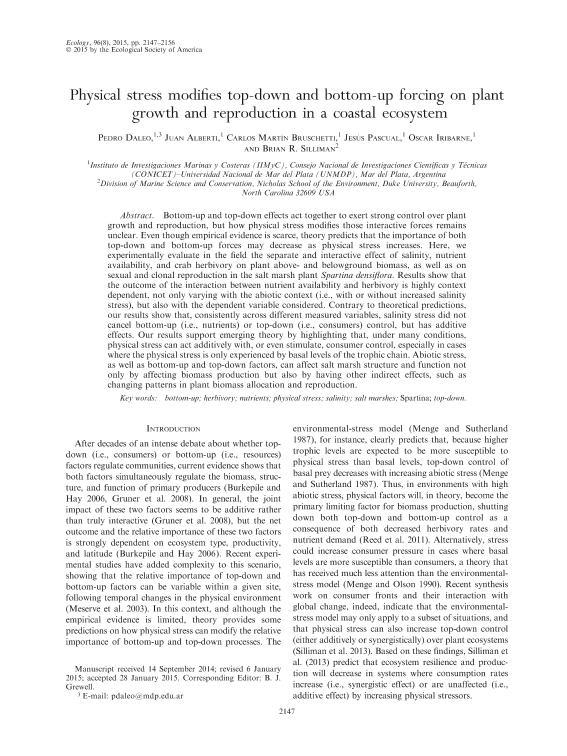Artículo
Physical stress modifies top-down and bottom-up forcing on plant growth and reproduction in a coastal ecosystem
Daleo, Pedro ; Alberti, Juan
; Alberti, Juan ; Bruschetti, Carlos Martin
; Bruschetti, Carlos Martin ; Pascual, Jesus Maria
; Pascual, Jesus Maria ; Iribarne, Oscar Osvaldo
; Iribarne, Oscar Osvaldo ; Silliman, Brian Red
; Silliman, Brian Red
 ; Alberti, Juan
; Alberti, Juan ; Bruschetti, Carlos Martin
; Bruschetti, Carlos Martin ; Pascual, Jesus Maria
; Pascual, Jesus Maria ; Iribarne, Oscar Osvaldo
; Iribarne, Oscar Osvaldo ; Silliman, Brian Red
; Silliman, Brian Red
Fecha de publicación:
08/2015
Editorial:
Ecological Society of America
Revista:
Ecology
ISSN:
0012-9658
Idioma:
Inglés
Tipo de recurso:
Artículo publicado
Clasificación temática:
Resumen
Bottom-up and top-down effects act together to exert strong control over plant growth and reproduction, but how physical stress modifies those interactive forces remains unclear. Even though empirical evidence is scarce, theory predicts that the importance of both top-down and bottom-up forces may decrease as physical stress increases. Here, we experimentally evaluate in the field the separate and interactive effect of salinity, nutrient availability, and crab herbivory on plant above- And belowground biomass, as well as on sexual and clonal reproduction in the salt marsh plant Spartina densiflora. Results show that the outcome of the interaction between nutrient availability and herbivory is highly context dependent, not only varying with the abiotic context (i.e., with or without increased salinity stress), but also with the dependent variable considered. Contrary to theoretical predictions, our results show that, consistently across different measured variables, salinity stress did not cancel bottom-up (i.e., nutrients) or top-down (i.e., consumers) control, but has additive effects. Our results support emerging theory by highlighting that, under many conditions, physical stress can act additively with, or even stimulate, consumer control, especially in cases where the physical stress is only experienced by basal levels of the trophic chain. Abiotic stress, as well as bottom-up and top-down factors, can affect salt marsh structure and function not only by affecting biomass production but also by having other indirect effects, such as changing patterns in plant biomass allocation and reproduction.
Palabras clave:
Bottom-Up
,
Herbivory
,
Nutrients
,
Physical Stress
,
Salinity
,
Salt Marshes
,
Spartina
,
Top-Down
Archivos asociados
Licencia
Identificadores
Colecciones
Articulos(IIMYC)
Articulos de INSTITUTO DE INVESTIGACIONES MARINAS Y COSTERAS
Articulos de INSTITUTO DE INVESTIGACIONES MARINAS Y COSTERAS
Citación
Daleo, Pedro; Alberti, Juan; Bruschetti, Carlos Martin; Pascual, Jesus Maria; Iribarne, Oscar Osvaldo; et al.; Physical stress modifies top-down and bottom-up forcing on plant growth and reproduction in a coastal ecosystem; Ecological Society of America; Ecology; 96; 8; 8-2015; 2147-2156
Compartir
Altmétricas



